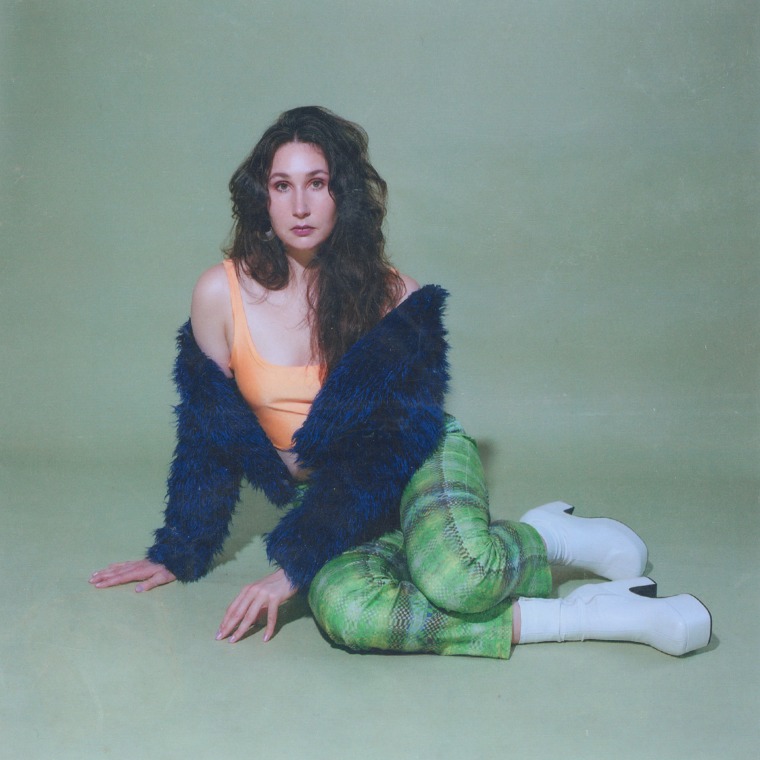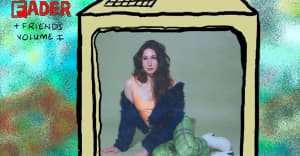
When I try and describe the kind of pop music that Carlyn Bezic makes, I can't do much better than Bezic herself. Speaking about her duo Ice Cream with The Toronto Star in 2019, she said, "Our music is this tension between wanting to write a pop hit and then being weirdos and liking weirdo music and that always kinda thwarting it being a pop hit." That push-and-pull very much applies to Jane Inc, Bezic's solo project. Before the release of the second Jane Inc album Faster Than I Can Take on April 22, The FADER is premiering "Human Being," its final single
While "Human Being" may be, as Bezic writes in a press statement, "a love letter to an audience, and a song about yearning for the performing self," the song's restorative pulse generates its energy from Bezic's singular vision of disco-pop. The song's synth bass growls warmly next to starry-eyed vocals, just one of the juxtapositions and curve balls that give the song a classic vibrancy. Listen to "Human Being" below, followed by a Q&A with Bezic about her time spent in the Toronto indie rock scene, releasing two albums in two years, and her approach to viewing and delivering performances.
You've been a consistent figure in Toronto's independent scene for years thanks to your work in U.S. Girls, Darlene Shrugg, and Ice Cream. What made 2021 the right year to go solo, and what lessons and experiences from your time in other bands informed your work as Jane Inc?
Number One was almost finished in March of 2020, and the first lockdown just sped up the process. All the other music work I had was cancelled, and I had always been working on music in a solo capacity, so it had been brewing for a while, and the pandemic created the circumstances for it to really grow.
I think every band and every album is a learning experience, or at least it should be! The Ice Cream records really taught me a lot about the process of making and putting out an album, and production, and mixing. Doing things with Darlene kept my guitar chops up. And the practice time with the U.S. Girls band before the lockdown really helped strengthen my voice, and showed me the subtleties involved in bringing recorded music to a live setting.
Your new project is arriving just over a year after your debut record Number One. When did you begin writing the songs for Faster Than I Can Take? Is there a through-line connecting the two albums?
I started writing Faster over the first lockdown in Toronto, in March and April of 2020, while I was prepping for Number One to be released. I felt like I had a better relationship with my voice, and more control over it, and the world was in turmoil and everything felt rich with meaning, so the songs just kind of came out. It was a unique time in that there were all these really heavy things happening in the world, but my day to day life was pretty simple and boring, and I had nothing else to do but make things. That was the seed, and over the next year it flowered, and more songs came, and those helped me fine tune the others and so on.
I think there are through-lines connecting all my work. The Ice Cream albums, the Jane Inc. albums, and my visual art work have recurring images and motifs and conceptual ideas that I can see at least. But I think Faster stands alone from the others a bit... I think it has an emotional urgency and a cohesion that comes from making it (relatively) quickly. Or maybe I just feel more confident? It's hard to know exactly! But it feels like an arrival of some kind.
"Human Being" is about feeling whole through performance. What are some performances you've seen by other artists or individuals that made you feel that sense of completion, or perhaps showed you how empowering performance could be?
I find every performance interesting, even the bad ones, because the bad ones can show you why the good ones work. But this is an interesting question because I don't think I feel the same sense of completion as an audience member, I think it's a different feeling that you get when you're being performed to. And I've seen too many good performances to narrow them down to a few, like, I've been moved at karaoke, ya know? Regardless, I do spend a lot of time thinking about why some performances are good and some aren't, and I think the key is always some kind of risk, or sense of vulnerability or truth-telling. The performer has to be dancing on the edge of some cliff, but also confident and controlled... They have to take you by the hand and genuflect at the same time or something. But even as I write that I'm starting to second-guess it! I guess part of why it's compelling to me is that it will always be a mysterious process.

